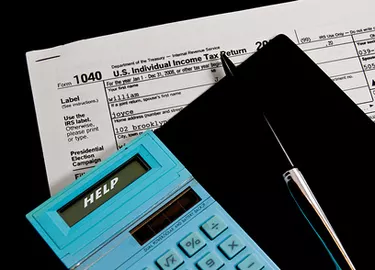
The one thing that no one questions about the American tax system is that all taxes are paid by people, be they owners or shareholders in corporations or members of the working class, many of whom pay higher tax rates than do some of America's super-rich.
As Emmanuel Saez and Gabriel Zucman, economists at the University of California at Berkley, write in the New York Times, "For the first time in the past hundred years, the working class – the 50 percent of Americans with the lowest incomes – today pays higher tax rates than billionaires." Such is the nature of a regressive tax system.
Video of the Day
Video of the Day
What Is a Regressive Tax System?
First, it's helpful to understand the regressive tax system definition. What is a regressive tax system? Well, it's unlike a progressive tax system whereby you owe more as a fraction of your income as you earn more.
With a regressive system, the Trumps, the Bezoses and the Buffetts of the world pay lower tax rates than teachers and secretaries do. As the wealthy earn more, the lower the percentage of their incomes they pay in taxes. As low-income households earn more, the higher the percentage of their incomes they pay in taxes.
The Inverse Relationship Between Tax Rates and Taxable Income
Under a regressive system of taxation, the higher the income of a taxpayer, the smaller the portion of his income that he pays the government as taxes. Thus, under a regressive system of taxation, society's poor are taxed at higher rates than are the rich. In effect, as a person's income – the tax base – rises, the rate of tax imposed on that income falls.
Consequently, there is an inverse relationship between the tax rate and taxable income. The lower a family's income, the larger the proportion of that income is paid in taxes and the less the family spends for the basics, including food, shelter and transportation.
Explain Regressive Tax
In contrast, an increase in the tax rate for a family that earns a high income has little, if any, effect on the family's ability to purchase the basics. Taxes may, however, decrease the family's ability to invest in stocks, increase its contributions to retirement savings or purchase luxury items, such as jewelry. While an increase in a tax rate might negatively affect a family's standard of living, it has little, if any, negative effect on the family's ability to purchase the essentials, such as food and clothing.
Advantages of Regressive Income Taxes
Some of the advantages of the regressive taxes include:
Reduces the Demand for Some Goods
Some taxing authorities impose regressive taxes on certain goods whose consumption a society wants to discourage. The theory is that as a regressive tax increases the effective price of a good, it may simultaneously reduce the demand for the good. Regressive tax examples include that imposed gasoline.
Restricts the Use of Goods That Adversely Affect Citizens' Health
By imposing a tax on goods, such as cigarettes, which adversely affect the health of the taxpayers, the tax furthers the public good.
Increases Efforts to Grow Income
The fact that a person who earns a high salary may be taxed at a lesser rate than a taxpayer who is paid a low salary incentivizes workers to increase their level of education or enhance their skillsets to earn a higher salary. By earning more money, the taxpayer ensures that a smaller portion of her income is taxed.
Simplifies Calculation of Taxes
If the regressive tax is also a flat tax, its application is a straightforward one. For instance, the implementation of a 5 percent tax on the sale of each and every item is more simple than a system that applies a 5 percent tax to some goods and a 9 percent tax to others.
Enhances Ability of Tax Payer to Determine Taxes Paid
A regressive tax system applies in equal measure to anyone who purchases a certain product, regardless of the buyer's income. If a person prefers to not pay a certain tax rate in order to acquire a product, she simply doesn't buy the product.
Encourages Investment
A regressive tax system benefits those with higher incomes in that they pay a lesser amount of taxes, which ensures they are able to save more money than will a person with a low income. Invariably, some money in a savings account is invested which increases its value in the long term.
Also, when a regressive tax is imposed on luxury items, it reduces their consumption, which may mean taxpayers save more money.